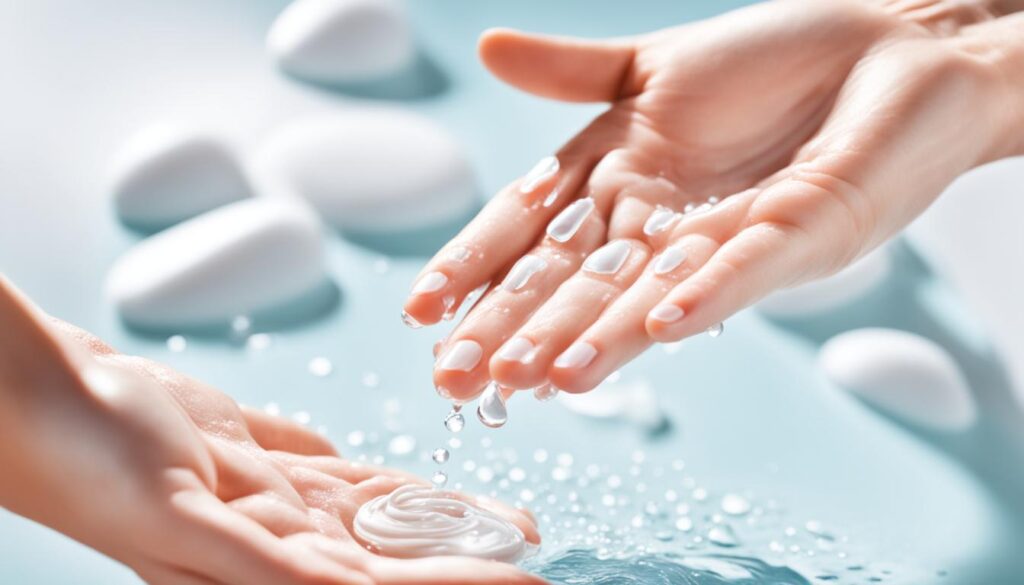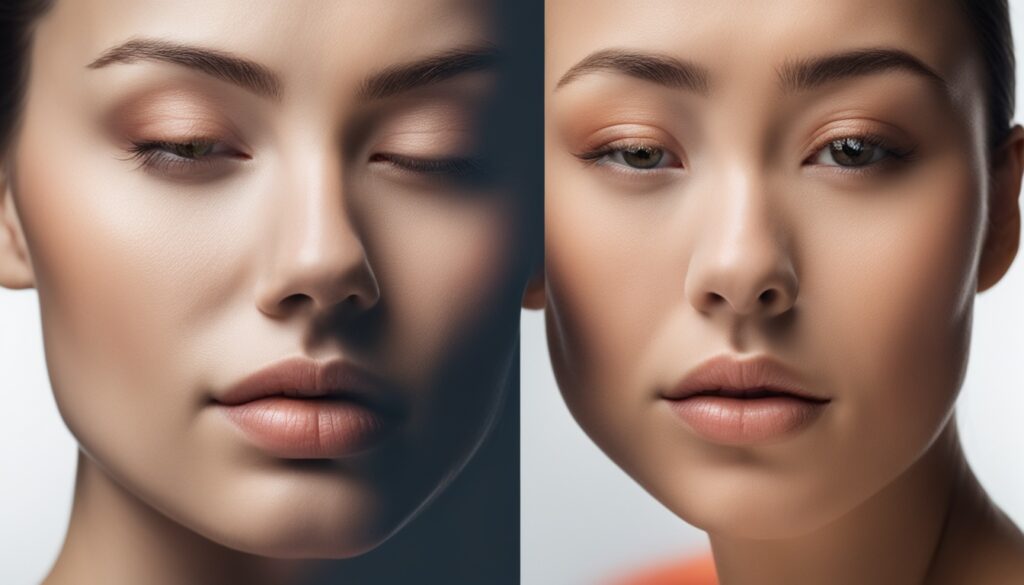Keeping your skin healthy is key to a glowing look. Small, daily steps go a long way in caring for your skin. They can prevent issues and boost your skin’s health. Incorporate these tips into your routine for better, brighter skin.
Protecting your skin from the sun is critical. Sun exposure leads to wrinkles, age spots, and skin cancer. Always use sunscreen, stay in shade when it’s sunny, and wear protective clothing.
Quitting smoking is also vital. It affects your skin’s blood vessels, making it look tired and old. Without smoking, you lessen the chance of early aging or skin cancer.
Be gentle with your skin. Short baths with warm water and mild soaps help. Moisturize after washing for soft, healthy skin. When shaving, go with the hair and use a cream or gel.
A healthy diet aids your skin. Eat plenty of fruits, veggies, and lean proteins. These foods fight aging and keep your skin looking fresh. Drinking water is just as important for a glow.
Stress harms your skin. Sleep enough and do things you love to manage stress. This keeps your skin clear and calm.
Your skin has its own ecosystem, or microbiome. Protect it by avoiding harsh products and sun damage. A healthy lifestyle helps your skin stay in balance.
Keeping your skin moist is beneficial. Use a good moisturizer after you wash your face. It keeps your skin hydrated and glowing.
By focusing on these simple steps, you can make a big difference in your skin’s health. Enjoy a healthier and more beautiful look by caring for your skin.
Key Takeaways:
- Protect your skin from sun damage by using sunscreen, seeking shade, and wearing sun-protective clothing
- Quit smoking to improve your skin’s overall health and reduce the risk of premature aging and skin cancer
- Practice gentle skincare habits like limiting bath time, using mild cleansers, and moisturizing dry skin
- Maintain a healthy diet rich in skin-healthy foods and stay hydrated for optimal skin health
- Manage stress through adequate sleep, setting limits, and engaging in activities that bring you joy
Protect Yourself from the Sun
Improving your skin health starts with shielding it from the sun. Too much sun can cause wrinkles, age spots, and might even lead to skin cancer.
To keep your skin safe, make these sun protection steps part of your daily routine:
Use Sunscreen with Broad-Spectrum SPF
Make sure you use sunscreen with SPF 15 or higher. It protects against UVA and UVB rays. These rays are the ones that harm your skin the most.
Don’t forget to put on more sunscreen every two hours. If you’re in the water or sweating a lot, you might need it sooner.
Seek Shade During Peak Sun Hours
Between 10 a.m. and 4 p.m., the sun’s rays can be very harmful. Try to stay in the shade then. It will help keep your skin safe from UV damage.
Wear Sun-Protective Clothing
Along with sunscreen, choose clothes that protect you from the sun. Wear shirts with long sleeves, pants, and big hats. They block the sun from touching your skin directly.

| Sun Protection Tips | Description |
|---|---|
| Use Broad-Spectrum Sunscreen | Defend your skin by using sunscreen with at least SPF 15. This should be done regularly. |
| Seek Shade | Avoid the sun’s direct rays during its strongest times by finding shade under trees or umbrellas. |
| Wear Protective Clothing | Use clothing with UPF to lower the amount of UV rays that touch your skin. |
Lock in skin safety by following sun protection steps. Doing so lowers the chances of sun damage. This keeps your skin looking and feeling healthy.
Quit Smoking
Smoking greatly affects your skin’s health and speeds up aging. The chemicals in cigarettes restrict blood flow to the skin. This stops essential nutrients and oxygen from reaching your skin, which can cause wrinkles, saggy skin, and a dull complexion.
Smoking also harms collagen and elastin, key to skin strength. Without them, your skin can’t stay firm and elastic, making it look older sooner.
Smoking even raises your chances of getting skin cancer. It damages the DNA in your skin, making it hard for your skin to heal and renew itself. Smoking is closely linked to squamous cell carcinoma, a form of skin cancer. So, stopping isn’t just good for your body, it’s essential for your skin’s health and to lower cancer risks.
Practice Gentle Skincare
Keeping your skin healthy means using gentle skincare and the right products. This helps keep your skin looking good.
Gentle Cleansing
Use mild cleansers for your skin type, not harsh soaps. The right cleanser gets rid of grime without drying the skin. It keeps your skin’s moisture natural, making it soft.
Limited Bath Time
Long baths can dry out your skin, so keep them short. Use warm water, not hot, to prevent oil loss. This keeps your skin from getting dry and itchy.
Shaving Tips
To shave without irritating your skin, prep with shaving cream. Shave in the same direction your hair grows to avoid bumps. These steps give you a smooth shave without hurting your skin.
Moisturizing Dry Skin
If your skin is dry, moisturize to keep it from feeling tight or itchy. Use a moisturizer that fits your skin type. Apply it to damp skin to trap moisture, making your skin smooth again.
Follow these simple steps for gentle skincare to keep your skin happy and healthy.

| Gentle Cleansing | Limited Bath Time | Shaving Tips | Moisturizing Dry Skin |
|---|---|---|---|
| Choose mild cleansers | Limit bath or shower time | Use shaving cream or gel | Select moisturizers for dry skin |
| Avoid harsh soaps and detergents | Use warm water instead of hot water | Shave in the direction of hair growth | Apply moisturizer on damp skin |
| Preserve the skin’s natural moisture barrier | Prevent dehydration and dryness | Protect against razor burns and irritation | Alleviate dryness and flakiness |
Maintain a Healthy Diet
The food you eat greatly affects your skin. By eating skin-healthy foods, you give your skin important nutrients and antioxidants. This can make your skin look younger, protect it from the sun, and help it stay moist.

Antioxidants for Skin Health
Antioxidants defend the skin from damage caused by free radicals. Free radicals are unstable and can harm your cells. Eating lots of fruits and veggies with antioxidants helps your skin fight stress and look fresh.
“Antioxidants can help counteract the damaging effects of UV rays and pollution, which can negatively impact your skin health.”
Omega-3 Fatty Acids for Skin Health
Omega-3 fatty acids are good for your skin. They help make your skin’s barrier stronger and lower inflammation. Eating omega-3s can also make your skin less dry and look better. You can find them in fish like salmon, nuts, seeds, and some oils.
“Including omega-3 fatty acids in your diet can support a healthy skin barrier, reducing dryness and improving overall skin complexion.”
Hydration and Green Tea
Staying hydrated is key for skin health. Drink plenty of water to keep your skin looking soft. Green tea also helps by providing skin benefits. It has antioxidants that can help your skin look and feel better.
“Staying hydrated and consuming green tea can contribute to a more youthful and radiant complexion.”
Foods for Skin Health:
| Category | Examples |
|---|---|
| Fruits | Berries, citrus fruits, papaya |
| Vegetables | Leafy greens, sweet potatoes, bell peppers |
| Whole Grains | Quinoa, brown rice, oats |
| Lean Proteins | Chicken, turkey, tofu |
| Omega-3 Rich Foods | Fatty fish, walnuts, flaxseeds |
| Green Tea | Matcha, sencha, jasmine green tea |
Eating well helps your skin a lot. These foods make your skin healthier and your face look bright and glowing.
Manage Stress
Stress affects your skin health, causing acne and more sensitivity. It’s important to use stress management in your daily life for healthy skin.
Getting enough sleep is a great way to reduce stress. Sleep lets your body rest and your skin recover. Try to sleep seven to nine hours each night for less stress and better skin.
It’s also smart to set limits to manage stress. Say no to more tasks when you feel too busy. Too many things to do can increase your stress and harm your skin. Learn to set boundaries and make your well-being a priority.
Doing things you like can lower your stress and make your skin better. Whether it’s yoga, painting, or reading, find activities that relax you. Carving out time for self-care can greatly reduce stress and keep your skin healthy.
Tip: A warm bath with calming oils like lavender or chamomile can help you relax and reduce stress.
Managing stress matters a lot for your skin’s health. By using stress management every day and focusing on self-care, you can better your skin.

Stress Management Techniques for Healthy Skin
| Technique | Description |
|---|---|
| Get Enough Sleep | Prioritize quality sleep to reduce stress levels and support skin health. |
| Set Reasonable Limits | Practice saying no to additional responsibilities and set boundaries to avoid overwhelming stress. |
| Engage in Enjoyable Activities | Make time for activities that bring you joy and help you relax, such as hobbies or leisurely pursuits. |
| Practice Deep Breathing or Meditation | Deep breathing exercises and meditation can help calm the mind and reduce stress levels. |
| Exercise Regularly | Engage in physical activities that you enjoy to promote overall well-being and relieve stress. |
Use these techniques daily to lower your stress and keep your skin healthy.
Protect Your Skin Microbiome
The skin has its own microbiome, which is a mix of bacteria and tiny organisms. It’s crucial for our skin’s health. These little beings form an ecosystem on your skin. They play a big part in how healthy and balanced our skin is.
Within this microbiome, good and bad bacteria exist. The good ones boost our immune system, protect our skin, and keep it healthy. But, the bad ones can cause skin problems.
Scientists are always learning more about the skin’s microbiome. They want to know how it shapes skin health. Their discoveries are leading to new skincare methods and products. These aim to help the good bacteria grow and keep the bad ones away.
Taking care of your skin’s microbiome is key to keeping your skin healthy. Here’s how you can do it:
- Choose gentle skincare products. They should help your skin’s natural balance. Avoid those with harsh chemicals.
- Think about adding probiotic skincare to your routine. These products introduce good bacteria to your skin.
- Eat a healthy diet full of skin-friendly nutrients. What you eat affects your skin’s microbiome.
- Don’t cleanse or exfoliate too much. It can remove the good bacteria and upset your skin’s balance.
- Work to reduce stress. Stress can harm your skin microbiome and its health.
Following these steps can keep your skin microbiome healthy. And this helps keep your skin looking and feeling great.
“Having a healthy skin microbiome is like having good gut bacteria; it plays an essential role in maintaining overall skin health and appearance.” – Dr. Jane Smith, Dermatologist
The Benefits of Supporting a Healthy Skin Microbiome
When your skin’s microbiome is well-balanced, your skin is better at fighting off irritants. It stays hydrated and healthy.
- Your skin is less inflamed and red. It looks calmer and more even.
- You heal faster from cuts and damage. Your skin becomes tougher.
- Overall, you get skin that looks healthy and glows.
Caring for your skin’s microbiome is an everyday thing. It’s about taking good care of your skin and your health. By looking after the friendly bacteria on your skin, your complexion stays bright and vibrant.
| Beneficial Skin Microbes | Harmful Skin Microbes |
|---|---|
| Lactobacillus | Staphylococcus aureus |
| Bifidobacterium | Propionibacterium acnes |
| Streptococcus thermophilus | Malassezia furfur |
Avoid Harmful External Factors
Things like too much sun and harsh products can hurt your skin. It’s key to reduce this harm and safeguard your skin.
Sun Exposure
Spending too much time in the sun can damage your skin. It can lead to sunburn, aging your skin too soon, and more skin cancer risk. Try not to be out in the sun a lot, especially when it’s strong. Stay in the shade when you can and use things like hats and clothes to protect yourself.
And always wear sunscreen that blocks both UVA and UVB rays. Its sun protection factor (SPF) should be at least 15. Remember to put on more sunscreen every two hours if you’re outside.
Harsh Skincare Products
Many skincare items have tough chemicals that can harm your skin. These can be too harsh or have a lot of alcohol. They might remove the natural moisture from your skin or mess up its balance.
Choose products made with gentle, nourishing stuff instead. Check the labels to pick ones that fit your skin well.
Unhealthy Lifestyle Habits
Choices like drinking a lot and eating badly can change how your skin looks. Too much alcohol can dry out your skin, making it look dull.
A diet that’s low in good nutrients can rob your skin of what it needs. This makes your skin health worse. Have less alcohol, eat lots of healthy food, and drink enough water.
Dehydration
Being dehydrated can really mess with your skin’s health. It makes your skin dry, itchy, and easily irritated. So, drink enough water every day.
Also, use a moisturizer that fits your skin to keep it from drying out. This will help your skin stay hydrated all day.
Smoking
Smoking is very bad for your health and your skin. It cuts down on blood flow to your skin, reducing the oxygen and good stuff it gets.
Without enough of these, your skin can look dull, get discolored, and wrinkle early. Quitting smoking is a big step to better skin health.
To keep your skin looking its best, protect it from the bad things. Avoid the sun too much, bad skincare, unhealthy living, dehydration, and smoking. Focus on good choices and skin care habits.
Moisturize and Hydrate Your Skin
Keeping your skin well-hydrated is key to looking great. Use moisturizers with lots of water to keep your skin moist. Make sure these products help your skin hold onto moisture for a long time.
After you shower, put on moisturizer. This keeps the water in your skin and stops it from drying out. Don’t forget to give extra care to dry areas like your elbows and knees. Use more moisturizer there.
Look for moisturizers with hyaluronic acid, glycerin, or ceramides. These ingredients pull in water and keep your skin from being dry. They make your skin soft and smooth. Choose products marked as “hydrating” for the best results.
If you have dry skin, using a thick moisturizer is best. It deeply hydrates your skin. Make sure to choose a moisturizer meant for dry skin. It will help your skin’s barrier keep water in.
Moisturizers keep water on the outside of your skin. But, you should also drink water. This keeps your skin hydrated from the inside. Drinking lots of water is good for your skin and your health.
Making moisturization part of your skincare is important. Find products that fit your skin’s needs. This will keep your skin healthy and glowing.
Conclusion
You can make your skin look better by doing a few things. First, always protect your skin from the sun. Also, stop smoking and be gentle when taking care of your skin. Eating well, reducing stress, and helping your skin’s good bacteria are also important.
These steps help your skin shine and stay safe. Keep at it, and you’ll improve your skin health. This way, you can look and feel great.
Don’t forget to keep up with your good skin habits. If you do, your skin will thank you with a beautiful glow and health.
FAQ
How can I improve my skin health?
You can boost your skin’s health with some simple steps. Protecting your skin from the sun is key. It’s also important to stop smoking. Additionally, be gentle when taking care of your skin. Eating well, managing stress, and supporting your skin’s microscopic world help too.
What should I do to protect myself from the sun?
To shield yourself from the sun, use sunscreen that’s at least SPF 15. Try to stay in the shade when the sun’s at its strongest. Wear protective clothes like long sleeves, pants, and hats with wide brims.
How does smoking affect my skin?
Smoking is bad for your skin in several ways. It narrows the skin’s blood vessels, which can lead to less blood flow. Less blood flow means less oxygen and nutrients for your skin, possibly causing wrinkles, sagging, and a dull look. Smoking also harms collagen and elastin, which can make your skin look older and increases your skin cancer risk.
What are some gentle skincare practices I should follow?
Keep your showers short and not too hot. Skip strong soaps and use shaving cream or gel. If your skin is dry, don’t forget to moisturize.
How can my diet affect my skin health?
The food you eat can really show on your skin. Fruits, veggies, whole grains, and lean proteins are great for it. So are foods with omega-3s. Drinking a lot of water and having green tea can also make a difference.
Can stress affect my skin?
Absolutely. Being stressed can lead to skin problems like acne. To keep your skin happy, manage stress with enough sleep and by not pushing yourself too hard. Doing things you love is also important.
What is the skin’s microbiome and how can I protect it?
The skin’s microbiome is a complex community of tiny organisms. They’re crucial for skin well-being. Scientists are finding ways to keep these microbes in balance. Doing so helps to keep your skin in top form.
What external factors should I avoid to maintain healthy skin?
To keep your skin healthy, limit sun time. Skip the harsh skincare products. Focus on a good diet, plenty of water, regular exercise, and not smoking. These choices can do wonders for your skin.
How important is moisturization and hydration for my skin?
Moisturizing and keeping your skin hydrated are key for its health. Use moisturizers with hydrating ingredients. Apply them after bathing or washing your face. Products that lock in moisture are also great.
How can I improve my overall skin health?
For better skin, stick to a healthy skincare routine. Make big changes like avoiding the sun and quitting smoking. Be gentle to your skin. Eat well, manage stress, and focus on your skin’s small friends too.

















